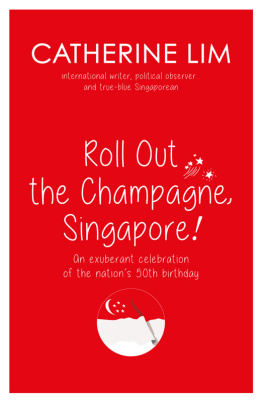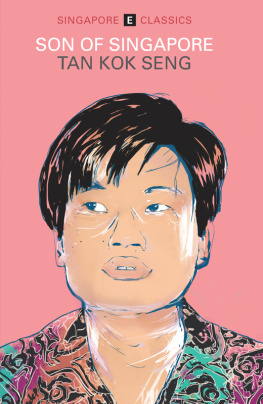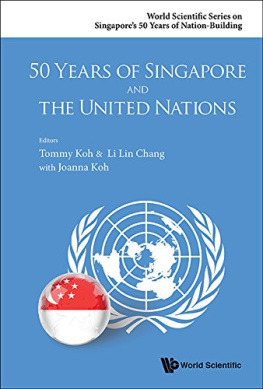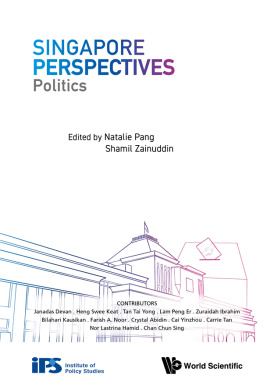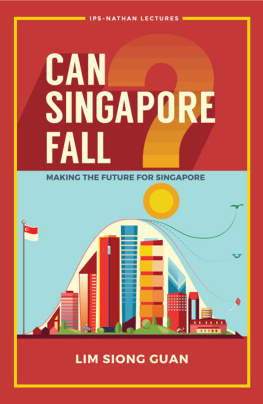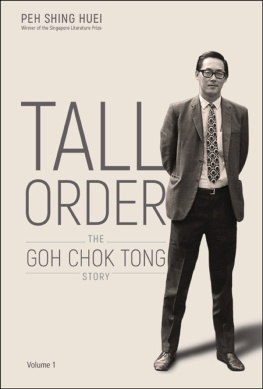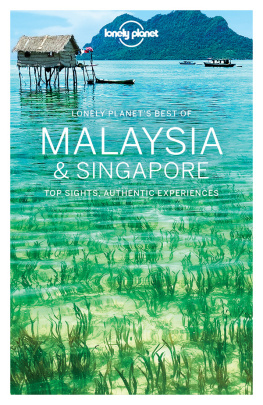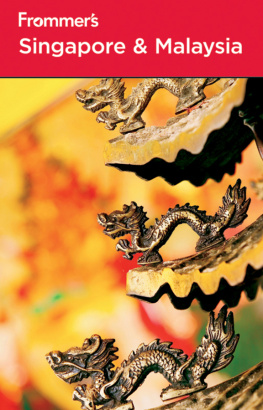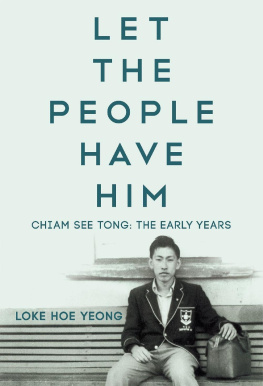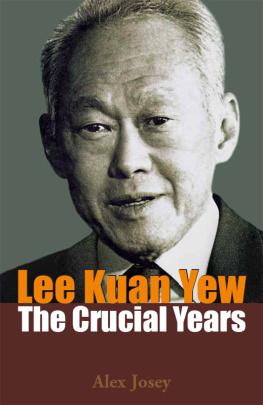
2014 Marshall Cavendish International (Asia) Private Limited
Published by Marshall Cavendish Editions
An imprint of Marshall Cavendish International
1 New Industrial Road, Singapore 536196
All rights reserved
No part of this publication may be reproduced, stored in a retrieval system or transmitted, in any form or by any means, electronic, mechanical, photocopying, recording or otherwise, without the prior permission of the copyright owner. Request for permission should be addressed to the Publisher, Marshall Cavendish International (Asia) Private Limited, 1 New Industrial Road, Singapore 536196. Tel: (65) 6213 9300.
Fax: (65) 6285 4871. E-mail:
The publisher makes no representation or warranties with respect to the contents of this book, and specifically disclaims any implied warranties or merchantability or fitness for any particular purpose, and shall in no events be liable for any loss of profit or any other commercial damage, including but not limited to special, incidental, consequential, or other damages.
Other Marshall Cavendish Offices:
Marshall Cavendish International. PO Box 65829, London EC1P 1NY, UK Marshall Cavendish Corporation. 99 White Plains Road, Tarrytown NY 10591-9001, USA Marshall Cavendish Intxernational (Thailand) Co Ltd. 253 Asoke, 12th Flr, Sukhumvit 21 Road, Klongtoey Nua, Wattana, Bangkok 10110, Thailand Marshall Cavendish (Malaysia) Sdn Bhd, Times Subang, Lot 46, Subang Hi-Tech Industrial Park, Batu Tiga, 40000 Shah Alam, Selangor Darul Ehsan, Malaysia.
National Library Board, Singapore Cataloguing-in-Publication Data
Lim, Catherine.
Roll out the champagne, Singapore! : an exuberant celebration of Singapores 50th birthday / Catherine Lim. Singapore : Marshall Cavendish Editions, [2014]
pages cm
ISBN : 978-981-4561-58-7 (paperback)
eISBN : 978 981 4561 97 6
1. National characteristics, Singaporean Anecdotes. 2. Singapore Social life and customs Anecdotes. 3. Singapore Biography Anecdotes. 4. Singapore History Anecdotes I. Title.
DSDS609.9
959.57 dc23 OCN885369208
Printed by Markono Print Media Pte Ltd
To Singapore, with love,
on her 50th birthday,
the country I adopted
and that has adopted me
Contents
Preface
When I was approached by my publisher Marshall Cavendish to write a commemorative book for the 50th anniversary of Singapores independence, I hesitated. I had felt that my long-time role as a political critic might not fit in with the celebratory mood of the occasion.
But then I realised that, as someone who came to live in Singapore nearly fifty years ago and has been happy ever since, there is much to celebrate about being among warm, friendly, supportive Singaporeans who had welcomed me into their midst right from the start. Indeed, I have many tales to tell, both about myself and my fellow Singaporeans, with all our joys and griefs and angers, our dreams fulfilled or lost, ourselves at our best and worst. They are tales interesting in themselves, because ultimately they are about the awesome human condition and the even more awesome human spirit.
Hence this book is primarily about ordinary Singaporeans among whom I am proud to count myself, living out our lives in a nation whose own life, with its share of triumphs and reverses, parallels ours. Weaving together our narratives, I have the fervent wish that as we advance together towards yet more birthdays, our greying, mellowing years will be touched by much peace and grace.
01
What Does Shakespeare Have to do with Singapores 50th Birthday?
When I was a schoolgirl back in my little hometown in Malaysia, so many years ago (well before Singapores birth as an independent nation), I was highly impressed by a play put up at a school concert by one of my teachers, an Irish nun who was a Shakespeare enthusiast.
The play was based on the famous All the worlds a stage speech in one of Shakespeares best-loved plays As You Like It, where the melancholy character Jacques divides human life into seven ages, from infancy through youth and middle age to final decline and death, assigning to each of the ages certain attributes and stringing them all together to form one long womb-to-tomb journey of breathtaking gloom and doom.
Sister M was the narrator in the play, as she did not trust anyone else to do full justice to the beautiful language of Shakespeare. For the benefit of the audience comprising the students and teachers of the school, she carefully and slowly enunciated each word in the speech as the seven actors appeared, one after another, on an improvised stage. (I remember the plentiful use of palm leaves, coconuts, hibiscus and sarong for the backdrop, as well as gentle Malay music coming from a gramophone record, to give Shakespeare a local flavour.)
As both producer and director, Sister showed admirable creativity. Firstly, in faithful adherence to the use of the masculine pronoun throughout the speech, she made all her girl actors wear khaki pants, establishing this item of clothing as a single, unmistakable indicator of the male gender. Secondly, despite all the girls being uniformly aged fourteen, she succeeded in giving a convincing impression of increasing age by making each actor display easily recognised age-related features of appearance and traits of behaviour. For instance, a chubby-faced girl who played the infant wore a bib, sucked on a pacifier, threw tantrums on a mat, and made all kinds of ridiculous gurgling sounds, to replicate the mewling and puking in Shakespeares speech. As for old age, there was a skinny girl who had white powdered hair and a forehead marked by rows of furrows conspicuously drawn in brown pencil, squinting painfully into her bowl as she tremblingly fed herself spoonfuls of watery rice porridge, to replicate the sad sans eyes, sans taste, sans everything condition of decrepitude.
At the end of the play, Sister made all the seven actors stand in a line to receive loud applause from the audience.
Heres an intriguing thought: can Shakespeares marvellous timeline of the human lifespan be extrapolated to nations? After all, nations, like individuals, have their milestones of birth, growth, peak and decline. So where would Singapore, on her 50th birthday, fit in? Youth or maturity? Adolescence or senescence?
There are a few delicate points to consider, since age is always a sensitive issue. At fifty years, Singapore, on the world stage today, is a distinctly young nation, compared to many countries that had achieved independence much earlier. Compared to India, for instance, Singapore is an infant; compared to Malaysia, she is a teenager. If we go further backwards in time and try to put Singapore on the historical stage with great civilisations such as China, she would be no more than a foetally curled up unborn in the civilisational womb.
But comparing ages is always tricky business, and Shakespeares timeline presents special problems. For it was based on the average life expectancy in his time, which was a shocking thirty-eight years. Even adjusting for the high infant mortality rate in Elizabethan times, this is an amazing contrast to the life expectancy of about eighty years for Singapore today. That means that according to Shakespeares chronometer, Singapore, on her 50th birthday, would be pretty old, perhaps even close to the senility described at the end of the speech.
That also means that I, at age seventy-three, would fare even worse! I am more pitiful than the old man of the seventh and last stage, who has entered second childhood and is about to shuffle off his mortal coil and make a final exit. If Shakespeare had used females instead of males to depict those seven stages, I would be called something that Ive always found to be a particularly odious term for an old woman a beldame.
Next page
